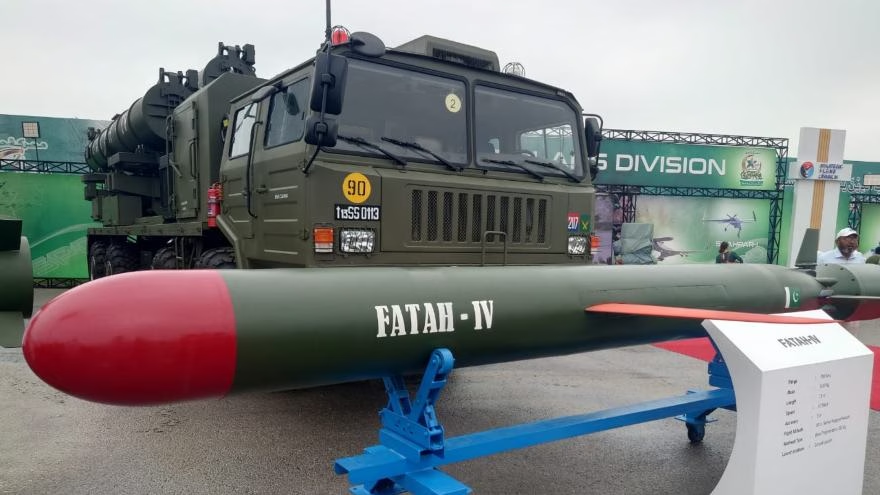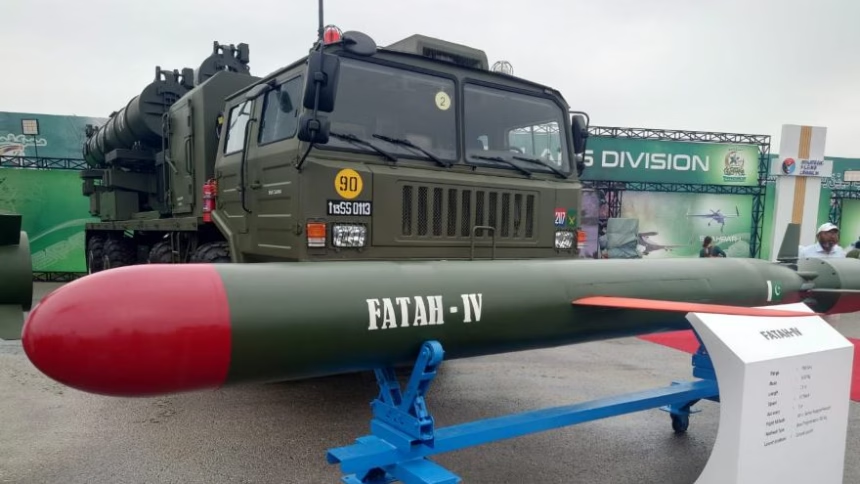Islamabad, September 30, 2025 —
The Pakistan Army has successfully conducted a training launch of the Fatah-4 Cruise Missile, marking an important milestone in the country’s conventional strike capability. The launch was confirmed by the Inter-Services Public Relations (ISPR), which described the event as a success that adds greater reach, accuracy, and lethality to Pakistan’s missile arsenal.

What is the Fatah-4 Cruise Missile?
The Fatah-4 is an indigenously developed ground-launched cruise missile with a reported range of 750 kilometers. Unlike ballistic missiles, cruise missiles fly at low altitudes and can follow terrain contours — a feature known as terrain-hugging flight — which allows them to evade advanced radar and air defense systems.
This missile is equipped with modern avionics and advanced navigation technology, improving both precision and survivability. Defense analysts note that the Fatah-4 has an estimated circular error probable (CEP) of 5 meters, making it extremely accurate. It reportedly carries a conventional blast-fragmentation warhead and can travel at subsonic speeds of around Mach 0.7.
The Training Launch and Official Reactions
The ISPR confirmed that the test was part of routine training designed to enhance the capabilities of Pakistan’s missile forces. Senior military officials, defense engineers, and scientists witnessed the launch.
Pakistan’s President, Prime Minister, the Chairman of the Joint Chiefs of Staff Committee, and the Chiefs of the Army, Navy, and Air Force all congratulated the participating teams for the successful missile launch. The official statement emphasized that the Fatah-4 Cruise Missile test highlights Pakistan’s ability to maintain a credible conventional deterrence posture.
Strategic Importance in the Regional Context
Earlier this year, Pakistan established the Army Rocket Force Command (ARFC), a new command structure aimed at consolidating all missile and rocket forces under one umbrella. The successful test of the Fatah-4 fits into this larger strategy of modernizing the country’s defense infrastructure.
The development is significant in the context of South Asia’s security environment. With a range of 750 km, the Fatah-4 gives Pakistan the ability to strike high-value targets deep inside adversary territory, should the need arise. Unlike nuclear-capable missiles, the Fatah-4 is designed as a conventional strike weapon, offering Pakistan a flexible response option in any future conflict scenario.
Cruise missiles also provide operational advantages because they can maneuver mid-flight, making interception by enemy defense systems far more challenging. For Pakistan, this technology represents not only a leap in defense technology but also a clear signal of its intent to maintain conventional deterrence without necessarily escalating to nuclear thresholds.
Analysts’ Perspective
Military experts view this test as a step forward in Pakistan’s long-term defense modernization plan. However, they also point out that much will depend on how the missile performs under real-world operational conditions.
Modern air defense systems, particularly those deployed by technologically advanced adversaries, continue to evolve rapidly. Whether the Fatah-4 can consistently penetrate these defenses will only be proven with further testing and eventual deployment.
In addition, analysts highlight that while the test strengthens Pakistan’s image as a country capable of producing sophisticated weapons, it could also heighten regional tensions. Each successful missile launch in South Asia often triggers responses and counter-developments from neighboring countries, particularly India.
Broader Implications
The Pakistan Army Missile Test comes at a time when the country is focusing on strengthening its self-reliance in defense technology. The emphasis on indigenous development ensures that Pakistan can continue to expand its arsenal despite international restrictions and sanctions on sensitive military imports.
Furthermore, the successful training launch of the Fatah-4 Cruise Missile demonstrates the growing skill set of Pakistan’s engineers and defense industry. It also signals to global observers that Pakistan is determined to remain competitive in the evolving landscape of military technology.









